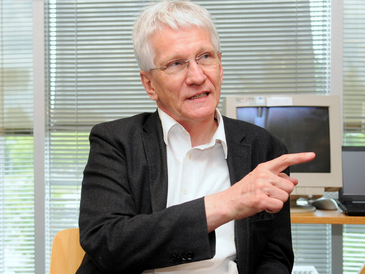The internationally renowned expert in East European history, Dr. Wolfgang Eichwede, professor emeritus for Politics and Contemporary History and founding director of the Research Center for Eastern European Studies at the University of Bremen is to receive the Aleksandre Men Prize 2011. The prize, worth € 2,500, will be presented in Moscow on 18th May. The prize is awarded to persons who make outstanding contributions to promoting understanding between Russia and Germany. Previous prize winners include the writers Lew Kopelew, Tchingis Aitmatow and Ljudmila Ulizkaja, the journalist Gerd Ruge, Michail Gorbatschow, and most recently the composer Sofia Gubaidulina.
Eichwede, who lived and worked in Moscow during the time of change and upheaval in eastern Europe, made a major contribution through press, radio and television to projecting a differentiated picture of East Europe to the German public. He was able to accomplish this not least due to the internationally acclaimed archive of Samizdat cultures at his disposal through the Bremen Research Center for Eastern European Studies: banned artistic, literary and academic productions from Poland, the Soviet Union, Czechoslovakia, Hungary and the German Democratic Republic produced outside of censorship in the cultural and intellectual underground.
Eichwede’s occupation with Samizdat literature continues up to the present day: under his leadership, an international research project is carrying out a comparative study of dissent and culture in eastern Europe. The results, encompassing four volumes, are to be published before end of the year. Besides this, he is currently working on a history of Samizdat cultures in the Soviet Union. In common with a large number of Men prize winners, the Russian Orthodox Archpriest Aleksandre Men was himself a Samizdat activist who showed immense civil courage by circulating his writings. Men was assassinated in 1990. For his part, Eichwede, against great resistance and through his work in the “Research Group Soviet Culture Goods” in the 1990s, contributed to ensuring that so-called “looted art” did not become a stumbling block but rather a bridge of understanding.
Born in Friedrichshafen in 1942, the historian has been recipient of a number of awards; for instance, in 2002 the Hungarian State Prize for Culture, which is usually only granted to high-profile foreign politicians. Then in 2003 the Order of Merit of the Federal Republic of Germany [Bundesverdienstkreuz] 1st class. The Order of Merit was awarded in recognition of his work within the context of the “Potsdam Meetings” organized by the German-Russian Forum and initiated by the German President, as well as for his commitment to integrating Russian students and educators in German research and training programs.

